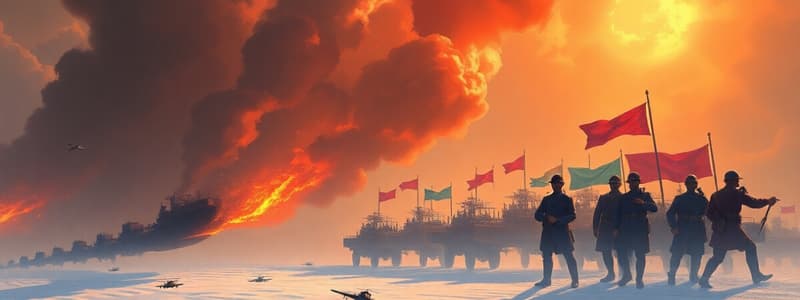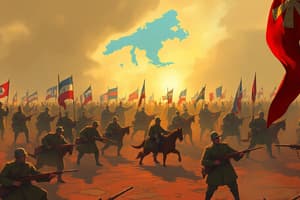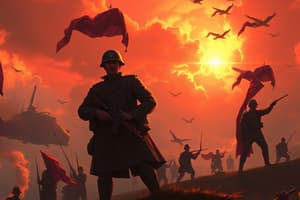Podcast
Questions and Answers
What were the two opposing alliances that existed in Europe prior to World War I?
What were the two opposing alliances that existed in Europe prior to World War I?
The two alliances were the Triple Alliance and the Triple Entente.
What significant event occurred in 1871 that impacted the European political landscape?
What significant event occurred in 1871 that impacted the European political landscape?
The formation of the German Empire in 1871.
Explain the difference between the Triple Alliance and the Triple Entente in terms of their commitments.
Explain the difference between the Triple Alliance and the Triple Entente in terms of their commitments.
The Triple Alliance was a legally binding agreement where members were obligated to go to war if one of them was attacked. The Triple Entente, however, was not a legally binding agreement, but a general understanding that they would support each other.
What were Wilhelm II's concerns that led him to strengthen ties with Austria-Hungary and focus on building a navy?
What were Wilhelm II's concerns that led him to strengthen ties with Austria-Hungary and focus on building a navy?
How did Germany's actions in building up its navy affect other European powers?
How did Germany's actions in building up its navy affect other European powers?
Describe the Franco-Russian Alliance and its significance in the context of the European alliances.
Describe the Franco-Russian Alliance and its significance in the context of the European alliances.
What were the main factors that led Britain to form an alliance with France and Russia?
What were the main factors that led Britain to form an alliance with France and Russia?
Explain how the events discussed in the text contributed to the outbreak of World War I.
Explain how the events discussed in the text contributed to the outbreak of World War I.
According to Source 1.3, why would Clemenceau have been hesitant to accept Wilson's ideals for Eastern Europe?
According to Source 1.3, why would Clemenceau have been hesitant to accept Wilson's ideals for Eastern Europe?
What did Clemenceau demand from Germany in the Treaty of Versailles?
What did Clemenceau demand from Germany in the Treaty of Versailles?
Explain why Clemenceau feared Germany would be able to recover from the war more quickly than France.
Explain why Clemenceau feared Germany would be able to recover from the war more quickly than France.
How was France's total wartime casualties compared to Britain's total wartime casualties?
How was France's total wartime casualties compared to Britain's total wartime casualties?
What were the major concerns that Clemenceau had about Germany's future after the war?
What were the major concerns that Clemenceau had about Germany's future after the war?
What was the main compromise that Clemenceau had to accept at the Paris Peace Conference?
What was the main compromise that Clemenceau had to accept at the Paris Peace Conference?
In what ways did the Paris Peace Conference reflect Wilson's ideals of self-determination?
In what ways did the Paris Peace Conference reflect Wilson's ideals of self-determination?
How did Clemenceau's actions regarding the Treaty of Versailles reflect the concerns of the French public?
How did Clemenceau's actions regarding the Treaty of Versailles reflect the concerns of the French public?
What event in 1914 sparked the outbreak of World War I?
What event in 1914 sparked the outbreak of World War I?
What were the major reasons for Russia's withdrawal from World War I in 1917?
What were the major reasons for Russia's withdrawal from World War I in 1917?
What were some of the major geopolitical changes that occurred as a result of World War I?
What were some of the major geopolitical changes that occurred as a result of World War I?
How did the United States benefit from its involvement in World War I?
How did the United States benefit from its involvement in World War I?
What was the primary goal of the Paris Peace Conference in 1919?
What was the primary goal of the Paris Peace Conference in 1919?
What were two key events that led to the Russian Civil War?
What were two key events that led to the Russian Civil War?
What was the defining characteristic of the Bolsheviks and how did they differ from the opposing Whites?
What was the defining characteristic of the Bolsheviks and how did they differ from the opposing Whites?
What were the main reasons for the involvement of foreign powers in the Russian Civil War?
What were the main reasons for the involvement of foreign powers in the Russian Civil War?
How did Japan benefit from its decision not to actively participate in the fighting during World War I?
How did Japan benefit from its decision not to actively participate in the fighting during World War I?
Why was the world considered a dark place in 1919 despite the end of World War I?
Why was the world considered a dark place in 1919 despite the end of World War I?
What key figure offered optimism for a better future after World War I?
What key figure offered optimism for a better future after World War I?
What was the significance of the Treaty of Brest-Litovsk?
What was the significance of the Treaty of Brest-Litovsk?
What was the main purpose of the Paris Peace Conference?
What was the main purpose of the Paris Peace Conference?
What made the task of reaching a settlement at the Paris Peace Conference difficult?
What made the task of reaching a settlement at the Paris Peace Conference difficult?
What was the ultimate fate of the Austro-Hungarian Empire after World War I?
What was the ultimate fate of the Austro-Hungarian Empire after World War I?
What impact did World War I have on Germany's government?
What impact did World War I have on Germany's government?
Who were the leaders of the 'Big Three' at the Paris Peace Conference?
Who were the leaders of the 'Big Three' at the Paris Peace Conference?
What sentiment was strong among the people of Britain and France regarding Germany after World War I?
What sentiment was strong among the people of Britain and France regarding Germany after World War I?
What was the purpose of the Treaty of Brest-Litovsk?
What was the purpose of the Treaty of Brest-Litovsk?
What were Woodrow Wilson's views on Germany's punishment after the war?
What were Woodrow Wilson's views on Germany's punishment after the war?
What major international organization did Wilson advocate for at the Paris Peace Conference?
What major international organization did Wilson advocate for at the Paris Peace Conference?
What was one of Wilson's key principles outlined in his Fourteen Points?
What was one of Wilson's key principles outlined in his Fourteen Points?
How did Lloyd George's priorities differ from those of Wilson?
How did Lloyd George's priorities differ from those of Wilson?
Why was Clemenceau particularly concerned about Wilson's ideals?
Why was Clemenceau particularly concerned about Wilson's ideals?
What challenge did Lloyd George face from the British public regarding Germany?
What challenge did Lloyd George face from the British public regarding Germany?
How did the Russian Civil War affect Lloyd George's position at the conference?
How did the Russian Civil War affect Lloyd George's position at the conference?
What was the main aim of the Paris Peace Conference for the leaders?
What was the main aim of the Paris Peace Conference for the leaders?
What did the harsh public sentiment towards Germany in Britain and France result in during the conference?
What did the harsh public sentiment towards Germany in Britain and France result in during the conference?
Why did Wilson believe in replacing Germany's old leadership?
Why did Wilson believe in replacing Germany's old leadership?
What was Lloyd George's overarching goal in the conference?
What was Lloyd George's overarching goal in the conference?
What economic concern did Lloyd George have regarding Germany post-war?
What economic concern did Lloyd George have regarding Germany post-war?
Flashcards
Great Powers
Great Powers
The six most powerful nations in 19th century Europe: Austria-Hungary, Britain, France, Germany, Italy, and Russia.
Triple Alliance
Triple Alliance
An alliance formed in 1882 between Germany, Austria-Hungary, and Italy.
Triple Entente
Triple Entente
An alliance of Britain, France, and Russia formed in response to the Triple Alliance.
Emperor Wilhelm I
Emperor Wilhelm I
Signup and view all the flashcards
Kaiser Wilhelm II
Kaiser Wilhelm II
Signup and view all the flashcards
Franco-Russian Alliance
Franco-Russian Alliance
Signup and view all the flashcards
Naval Arms Race
Naval Arms Race
Signup and view all the flashcards
Encirclement
Encirclement
Signup and view all the flashcards
The Big Three
The Big Three
Signup and view all the flashcards
Woodrow Wilson
Woodrow Wilson
Signup and view all the flashcards
Georges Clemenceau
Georges Clemenceau
Signup and view all the flashcards
David Lloyd George
David Lloyd George
Signup and view all the flashcards
Treaty of Brest-Litovsk
Treaty of Brest-Litovsk
Signup and view all the flashcards
Public Sentiment
Public Sentiment
Signup and view all the flashcards
Fourteen Points
Fourteen Points
Signup and view all the flashcards
League of Nations
League of Nations
Signup and view all the flashcards
Self-Determination
Self-Determination
Signup and view all the flashcards
Punishment of Germany
Punishment of Germany
Signup and view all the flashcards
Economic Recovery
Economic Recovery
Signup and view all the flashcards
Harsh Peace Settlement
Harsh Peace Settlement
Signup and view all the flashcards
Russian Civil War
Russian Civil War
Signup and view all the flashcards
Clemenceau's Determination
Clemenceau's Determination
Signup and view all the flashcards
Democratic Leaders
Democratic Leaders
Signup and view all the flashcards
French War Casualties
French War Casualties
Signup and view all the flashcards
Clemenceau's Concerns
Clemenceau's Concerns
Signup and view all the flashcards
Compromise at Versailles
Compromise at Versailles
Signup and view all the flashcards
Reparations
Reparations
Signup and view all the flashcards
Rhineland Control
Rhineland Control
Signup and view all the flashcards
Lloyd George's Reservations
Lloyd George's Reservations
Signup and view all the flashcards
Population Disparity
Population Disparity
Signup and view all the flashcards
Annexation of Bosnia
Annexation of Bosnia
Signup and view all the flashcards
Archduke Franz Ferdinand
Archduke Franz Ferdinand
Signup and view all the flashcards
Start of WWI
Start of WWI
Signup and view all the flashcards
Triple Alliance vs Triple Entente
Triple Alliance vs Triple Entente
Signup and view all the flashcards
Impact of WWI
Impact of WWI
Signup and view all the flashcards
Bolsheviks
Bolsheviks
Signup and view all the flashcards
Whites
Whites
Signup and view all the flashcards
United States' Role in WWI
United States' Role in WWI
Signup and view all the flashcards
Paris Peace Conference
Paris Peace Conference
Signup and view all the flashcards
Decreasing Power of Germany
Decreasing Power of Germany
Signup and view all the flashcards
Japan's WWI Experience
Japan's WWI Experience
Signup and view all the flashcards
Effects on Britain and France
Effects on Britain and France
Signup and view all the flashcards
Study Notes
European Great Powers and WWI
- Europe's most powerful nations (Austria-Hungary, Britain, France, Germany, Italy, and Russia) were known as the Great Powers by the 19th century.
- WWI, beginning in August 1914, stemmed from increasing tensions among these powers.
- Major European powers were divided into opposing alliances: Triple Alliance (Germany, Austria-Hungary, Italy, and later Ottoman Empire) and Triple Entente (Britain, France, and Russia).
Alliances and Conflicts
- Triple Alliance formed in 1879 between Germany and Austria-Hungary, and Italy joined in 1882.
- Triple Entente, a response to the Triple Alliance, was not legally binding but generally expected to involve mutual support.
- German Emperor (Kaiser) Wilhelm II's desire for global power and fear of encirclement by other nations led to naval build-up and alliance strengthening.
- Franco-Russian Alliance (1894) and British alliances with France and Russia (1907) were formed in response.
The Bosnian Crisis and Outbreak
- Austria-Hungary annexed Bosnia in 1908, a move that threatened Serbia and Russia.
- Germany supported Austria-Hungary, preventing a war over this issue.
- Archduke Franz Ferdinand's assassination in Sarajevo (1914) ignited a chain reaction. Austria-Hungary's war on Serbia triggered wider conflict, placing other countries into the war based on their alliances.
- By August 1914, Europe was embroiled in war.
Impact of WWI
- WWI was a global conflict, involving troops from various nations, including colonies.
- Other countries joined the conflict in support of allies (e.g., Japan and Italy joined the Triple Entente and the USA later).
- Russia withdrew in 1917 (Treaty of Brest-Litovsk).
- The war lasted over four years, ending with an armistice in November 1918.
- Estimated 40 million casualties from fighting, starvation, and disease resulted from the war.
- Germany (and Austria-Hungary) suffered significant political upheaval.
- Britain and France were weakened despite victory.
- Russia underwent two revolutions, leading to a civil war and the rise of communism.
The Russian Civil War
- March 1917 revolution (Overthrow of Tsar Nicholas II; a Provisional Government).
- November 1917 revolution (Bolshevik/Red Party led by Vladimir Lenin seized control - Communists).
- Civil war (Reds vs. Whites - anti-Bolshevik groups) broke out in 1917. Allies (Britain, France, Japan, etc.) supported the Whites.
- Reds won by 1922, establishing Russian communism.
Rise of the US
- US emerged as a major power post-war due to economic gains (weapon sales).
Japanese Influence
- Japan, with a treaty with Britain, remained largely uninvolved in the fighting, leading to economic and military growth.
The Paris Peace Conference
- Aim was to finalize WWI and establish treaties between Allies and Central powers (especially Germany).
- Key leaders/countries: US (Woodrow Wilson), UK (David Lloyd George), France (Georges Clemenceau) - "Big Three".
- Public sentiment in the Allies favored harsh treatment of Germany.
Aims of the Big Three
- Woodrow Wilson's idealism focused on a new world order, Fourteen Points plan for peace, and a League of Nations.
- David Lloyd George prioritized British interests, rebuilding the economy and empire, and a balance against rising communism.
- Georges Clemenceau aimed for harsh punishment of Germany to prevent future war given the devastation to France.
- Key differences emerged in negotiating terms of peace treaty.
Compromises and Treaty Negotiations (Paris Peace Conference)
- Significant disagreements existed between the Big Three (US, UK, & France).
- Compromises were reached, but not all objectives were fully met.
- Wilson's ideas on self-determination were partly accepted.
- Clemenceau saw some concessions on German limits in Rhineland and coalfields.
- Lloyd George maintained concern for Britain and a balance of power in Europe.
Studying That Suits You
Use AI to generate personalized quizzes and flashcards to suit your learning preferences.




